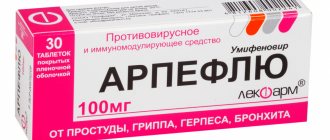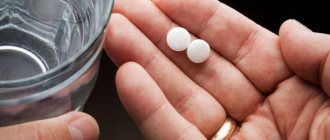pharmachologic effect
Glycine is a substance that is a non-essential amino acid. Under its influence, metabolic processes in brain tissue become more active and an antioxidant effect is provided. Glycine also regulates the activity of glutamate receptors. As a result, a person’s conflict, aggressiveness, and psycho-emotional stress decrease. The patient's mood improves, the drug helps overcome symptoms of insomnia , symptoms of vegetative-vascular disorders, disorders in people who have recently suffered a traumatic brain injury or ischemic stroke . In addition, glycine reduces the degree of toxic effects of ethanol on the central nervous system.
Pharmacological properties
Pharmacotherapeutic group:
metabolic agent.
ATX code:
N06BX.
Pharmacodynamics: Glycine is an amino acid and one of the main inhibitory neurotransmitters in the brain. Glycine normalizes and activates protective inhibition processes in the central nervous system, reduces psycho-emotional stress, and increases mental performance.
Glycine has glycine- and GABA-ergic, alpha1-adrenergic blocking effects, regulates the activity of glutamate (NMDA) receptors.
The drug has the following properties:
- – reduces psycho-emotional stress, aggressiveness, conflict, increases social adaptation;
- – improves mood;
- – makes it easier to fall asleep and normalizes sleep;
- – increases mental performance;
- – reduces vegetative-vascular disorders (including during menopause);
- – reduces the severity of brain disorders in ischemic stroke and traumatic brain injury;
- – reduces the toxic effect of alcohol and other drugs that depress the function of the central nervous system.
Pharmacokinetics:
easily penetrates into most biological fluids and tissues of the body, incl. into the brain; metabolized to water and carbon dioxide; accumulation in the body does not occur.
Indications for use Glycine Bio
There are the following indications for the use of Glycine Bio:
- stressful condition , which provokes a state of psycho-emotional tension;
- deviant behavior in adolescents and children;
- deterioration of mental performance;
- diseases of the nervous system of a functional and organic nature, in which there is a high level of excitability and emotional stress;
- insomnia, other sleep disorders associated with neuroses, vegetative dystonia, various forms of encephalopathy (including those associated with alcohol abuse);
- cerebral infarction.
The drug is used in narcology for treatment during remission in encephalopathy and NS lesions.
Buy Glycine sublingual tablets 100 mg No. 50 Biotics in pharmacies
Glycine Buy Glycine in pharmacies
MANUFACTURERS Biotics MNPC (Russia) Moskhimfarmpreparaty im. ON THE. Semashko (Russia) Ozon LLC (Russia
GROUP Amino acids
COMPOSITION The active substance is glycine.
INTERNATIONAL NON-PROPENTED NAME Glycine
SYNONYMS Glycine-Bio, Glycine-Bio Pharmaplant, Glycine-Canon, Glycine-MHPP
PHARMACOLOGICAL ACTION Glycine is a metabolic regulator, normalizes and activates protective inhibition processes in the central nervous system, reduces psycho-emotional stress, and increases mental performance. Glycine has glycine- and GABA-ergic, alpha1-adrenergic blocking, antioxidant, antitoxic effects; regulates the activity of glutamate (NMDA) receptors, due to which the drug is able to: reduce psycho-emotional stress, aggressiveness, conflict, increase social adaptation; improve mood; make it easier to fall asleep and normalize sleep; increase mental performance; reduce vegetative-vascular disorders (including during menopause); reduce the severity of brain disorders in ischemic stroke and traumatic brain injury; reduce the toxic effect of alcohol and other drugs that depress the function of the central nervous system. Pharmacokinetics. Easily penetrates into most biological fluids and tissues of the body, incl. into the brain; metabolized to water and carbon dioxide, its accumulation in tissues does not occur.
INDICATIONS FOR USE Reduced mental performance. Stressful situations - psycho-emotional tension (during exams, conflict, etc. situations). Deviant forms of behavior in children and adolescents. Various functional and organic diseases of the nervous system accompanied by increased excitability, emotional instability, decreased mental performance and sleep disturbances: neuroses, neurosis-like conditions and vegetative-vascular dystonia, consequences of neuroinfections and traumatic brain injury, perinatal and other forms of encephalopathies (including alcoholic origin). Ischemic stroke.
CONTRAINDICATIONS Individual hypersensitivity to the components of the drug.
SIDE EFFECTS Allergic reactions are possible.
INTERACTION Reduces the severity of side effects of antipsychotics (neuroleptics), anxiolytics, antidepressants, hypnotics and anticonvulsants.
METHOD OF APPLICATION AND DOSAGE Glycine is used sublingually or buccally, 100 mg (in tablets or in powder form after crushing the tablets). For practically healthy children, adolescents and adults with psycho-emotional stress, decreased memory, attention, mental performance, mental retardation, and deviant forms of behavior, glycine is prescribed 1 tablet 2-3 times a day for 14-30 days. For functional and organic lesions of the nervous system, accompanied by increased excitability, emotional lability and sleep disturbances, children under three years of age are prescribed 0.5 tablets (50 mg) per dose 2-3 times a day for 7-14 days, then 50 mg 1 time per day for 7-10 days. Daily dose - 100-150 mg, course dose - 2000-2600 mg. Children over 3 years of age and adults are prescribed 1 tablet 2-3 times a day, the course of treatment is 7-14 days. The course of treatment can be increased to 30 days; if necessary, the course is repeated after 30 days. For sleep disorders, glycine is prescribed 20 minutes before bedtime or immediately before bedtime, 0.5-1 tablet (depending on age). For ischemic cerebral stroke: during the first 3-6 hours from the onset of stroke, 1000 mg is prescribed buccally or sublingually with one teaspoon of water, then for 1-5 days 1000 mg per day, then over the next 30 days 1-2 tablets 3 times a day. In narcology, glycine is used as a means of increasing mental performance and reducing psycho-emotional stress during the period of remission in cases of encephalopathy, organic lesions of the central and peripheral nervous system, 1 tablet 2-3 times a day for 14-30 days. If necessary, courses are repeated 4-6 times a year.
OVERDOSE No data available.
SPECIAL INSTRUCTIONS No data available.
STORAGE CONDITIONS Store in a dry place, protected from light and out of reach of children, at a temperature not exceeding 25 C.
Instructions for use Glycine Bio (Method and dosage)
Instructions for use provide for transbuccal or sublingual use of tablets. In stressful situations, memory deterioration, decreased performance, as well as deviant behavior , adult patients and children are advised to take 100 mg of the drug 2-3 times a day. Treatment can last up to 1 month.
If the patient is diagnosed with lesions of the nervous system , in which symptoms of excitability and emotional arousal are noted, the drug is prescribed to children under three years of age in a dose of 50 mg Glycine Bio 2-3 times a day for 1-2 weeks, children after three years of age should receive 100 mg 2-3 times a day. The course can last from 1 to 4 weeks.
If the patient has sleep disorders , then, depending on the person’s age, he needs to take 50-100 mg of the drug before going to bed.
Patients with cerebral infarction need to take 1 g of the drug in the first 3-6 hours after the onset of stroke . In the next 1-5 days you should take 1 g of the product per day, then for another 30 days. 100-200 mg three times a day.
In drug treatment practice, 100 mg is prescribed 2-3 times a day, treatment lasts from 2 to 4 weeks.
Glycine-bio pharmaplant 100 mg 150 pcs. sublingual tablets
pharmachologic effect
Metabolic agent.
Composition and release form Glycine-bio pharmaplant 100 mg 150 pcs. sublingual tablets
Tablets - 1 tablet:
- active substance: glycine 0.05 g and 0.1 g;
- excipients: povidone (kollidon 25), microcrystalline cellulose, magnesium stearate.
10, 50 tablets per blister pack.
10, 30, 50 or 100 tablets in a polymer container for medicines or a glass bottle. One container (bottle) or 1, 3, 5 or 10 blister packs along with instructions for use are placed in a cardboard pack.
5, 10 or 20 containers (bottles) or 20, 30, 50 or 100 blister packs together with the corresponding number of instructions for use are placed in a cardboard box (for hospitals).
Description of the dosage form
White tablets with a score on one side and a bevel on both sides. Marbling is allowed.
Directions for use and doses
Sublingual or buccal 100 mg (in tablets or in powder form after crushing the tablets).
For practically healthy children, adolescents and adults with psycho-emotional stress, decreased memory, attention, mental performance, mental retardation, and deviant forms of behavior, glycine is prescribed 100 mg 2-3 times a day for 14-30 days.
For functional and organic lesions of the nervous system, accompanied by increased excitability, emotional lability and sleep disturbances, children under 3 years of age are prescribed 50 mg 2-3 times a day for 7-14 days, then 50 mg 1 time a day for 7-10 days. Daily dose - 100-150 mg, course dose - 2-2.6 g.
Children over 3 years of age and adults are prescribed 100 mg 2-3 times a day, the course of treatment is 7-14 days, it can be increased to 30 days, if necessary, the course is repeated after 30 days.
For sleep disorders, 50-100 mg is prescribed 20 minutes before bedtime or immediately before bedtime (depending on age).
In narcology - 100 mg 2-3 times a day for 14-30 days. If necessary, courses are repeated 4-6 times a year.
Pharmacodynamics
A non-essential amino acid, a central inhibitory neurotransmitter. Improves metabolic processes in brain tissue, has an antidepressant and sedative effect. It has GABAergic, alpha 1-adrenergic blocking, antioxidant and antitoxic effects; regulates the activity of glutamate (NMDA) receptors, thereby reducing psycho-emotional stress, aggressiveness and conflict; improves social adaptation and mood; makes it easier to fall asleep and normalizes sleep; increases mental performance; reduces the severity of vegetative-vascular disorders (including during menopause), reduces the toxic effect of ethanol on the central nervous system. Effective as an adjuvant for epileptic seizures.
Pharmacokinetics
Easily penetrates into most biological fluids and body tissues, including the brain, and does not accumulate. It is quickly destroyed in the liver by glycine oxidase to water and carbon dioxide.
Indications for use Glycine-bio pharmaplant 100 mg 150 pcs. sublingual tablets
Stressful conditions (including psycho-emotional stress), decreased mental performance, deviant forms of behavior in children and adolescents, various functional and organic diseases of the nervous system, accompanied by increased excitability, emotional instability, decreased mental performance and sleep disturbances: neuroses, neurosis-like conditions, consequences of neuroinfections and traumatic brain injuries, perinatal and other forms of encephalopathies (including those of alcoholic origin). In narcology - as a drug that increases mental performance and reduces psycho-emotional stress during the period of remission in cases of encephalopathy, organic lesions of the central and peripheral nervous system.
Contraindications
Hypersensitivity.
With caution: arterial hypotension.
Application of Glycine-bio pharmaplant 100 mg 150 pcs. sublingual tablets during pregnancy and breastfeeding
Maybe.
special instructions
In patients with a tendency to arterial hypotension, Glycine-Bio Pharmaplant® is taken in smaller doses and under the control of blood pressure; if it decreases below the usual level, the intake is stopped.
Impact on the ability to drive vehicles and operate machinery
When taking the drug Glycine-Bio Pharmaplant®, you should be careful when driving vehicles and engaging in other potentially hazardous activities that require increased concentration and speed of psychomotor reactions, taking into account the side effect profile.
Side effects Glycine-bio pharmaplant 100 mg 150 pcs. sublingual tablets
Allergic reactions.
Drug interactions
Reduces the severity of side effects of antipsychotic drugs (neuroleptics), anxiolytics, antidepressants, sleeping pills and anticonvulsants.
Analogs
Level 4 ATX code matches:
Bravinton
Acefen
Carnicetine
Pyracesin
Nooclerin
Semax
Piracetam
Olatropil
Fezam
Vinpocetine
Cerebrocurin
Cavinton Forte
Calcium hopantenate
Glutamic acid
Cephabol
Olanzapine
Cerebrolysate
Pramistar
Sidnocarb
Vinpotropil
There are a number of analogues of this drug. These are the drugs Glycine Ozone , Glycised , Glycine Forte , Glycine Biotics and other drugs whose active ingredient is glycine. But only a doctor should choose the most suitable drug in each case.

